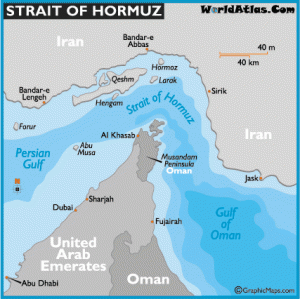 Iran renewed threats on Sunday to close the Strait of Hormuz unless sanctions against it were revoked, though it remains unclear how Tehran could shut down the vital oil shipping channel given the significant American military presence there.
Iran renewed threats on Sunday to close the Strait of Hormuz unless sanctions against it were revoked, though it remains unclear how Tehran could shut down the vital oil shipping channel given the significant American military presence there.
The Iranian parliament is considering a bill calling for the strait to be closed. The assembly has little control over national defense and foreign policy decisions and, while the bill would be largely symbolic, it would indicate the legislature’s support behind any leadership decision to close the strait.
“(Under the bill) the closure of the Strait of Hormuz will continue until the annulment of all the sanctions imposed against Iran,” lawmaker Javad Karimi Qoddousi was quoted as saying by the Fars news agency.
The bill will be taken up by parliament this month, said another lawmaker, Seyed Mehdi Moussavinejad, Fars reported.
Foreign and national defence policy rests with Supreme Leader Ayatollah Ali Khamenei and the elite Islamic Revolutionary Guard Corps.
Iran has repeatedly threatened to close the Strait of Hormuz shipping channel, through which 40 percent of the world’s seaborne oil exports passes, in retaliation for sanctions placed on its crude exports by Western powers.
The sanctions were imposed over Iran’s nuclear programme, which the West suspects is aimed at creating an atomic weapon and Tehran says is for peaceful energy purposes.
The United States has beefed up its presence in the Gulf, adding a navy ship last week to help mine-clearing operations if Iran were to act on its threats.
The Iranian chief of staff of the armed forces, Seyed Hassan Firouzabadi, said on Sunday that any decision to close the strait would have to come from Khamenei, with the Supreme National Security Council advising him, according to Fars.
Military analysts have cast doubt on Iran’s willingness to block the slender waterway, given the massive U.S.-led retaliation it would likely incur.
Alarmed by the Iranian threats, the United Arab Emirates has completed a long-awaited oil export terminal on the Gulf of Oman, loading the first cargo on Sunday. The Gulf OPEC member hopes to increase exports from the new facility to around 1.5 million barrels per day (bpd).
An Iranian official said on Sunday that the UAE pipeline would not be able to meet the world’s oil demand if the Strait of Hormuz were closed.
Reuters

Leave a Reply
You must be logged in to post a comment.